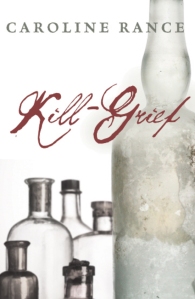Hello and welcome, Caroline. Would you like to tell us a bit about the book?
Hi Nik, thanks for inviting me onto your blog. My book is called Kill-Grief and is set in the hard-drinking world of a 1750s hospital. It’s about a woman who reluctantly becomes a nurse in an attempt to carve an independent future for herself, but she soon finds her past catching up with her. It’s quite dark and a bit gruesome in places, but it also has positive themes of determination and survival.
‘Kill-Grief’s’ one heck of a title. Can you tell us how it came about?
‘Kill-Grief’ is one of many 18th-century slang words for gin, and in the book the main character, Mary, has a constant battle with drink. She uses it as a means of escaping from the horrors of hospital life and trying to blot out the secrets she carries, but it increasingly puts her in danger.
When I started writing the book, gin was only going to have a minor role, but it ended up almost becoming a character in its own right. For a while I thought about using another of its nicknames – Sky Blue – as the title, because there’s also a piece of blue silk that crops up in the story, but I decided it was too wishy-washy. Kill-Grief is darker and more atmospheric, and hopefully warns the reader to expect a bit of blood!
Your story’s set in Chester in the middle of the eighteenth century. What kind of place was it then? And what was the most interesting thing you discovered during your research?
Chester was becoming quite an upmarket centre for luxury goods, but like other cities at that time, there was a lack of sanitation and extremes of poverty and wealth. In the book, I portray it as muddy, smelly and noisy – a real contrast to the quiet coastal village that Mary comes from. Compared with London, however, Chester was thought to be a healthy place to live because the Rows (raised walkways in front of the shops) allowed people to keep out of the grime and rain. There were smart new houses being built and social improvements like the new hospital, but the city gaol was one of the least humane prisons in the country. The gaol scenes in the book are actually toned down, because the reality was even worse. One of the most interesting things I found out was that there was a cell called ‘Little Ease’ that was only 4’6” high and 17 inches wide. Yikes!
What do you make of medicine in the 1700s?
The lack of anaesthesia and poor understanding of infection severely limited medicine and surgery, but hindsight makes it too easy to see it as barbaric. The doctors and surgeons of the time set out to cure, not to be cruel, but although it was a period of scientific breakthrough, tradition still stood in the way of progress. Blood-letting, for example, sounds frightening, but it was often the patients themselves who insisted on it because it was an old, familiar practice that made them feel something was being done.
Those who couldn’t afford doctors (or didn’t trust them) relied on folk remedies or quack nostrums, or just had to put up with their condition. One of the patients at the early Chester Infirmary had been suffering from a leg ulcer for 36 years! Until the hospital was established, there was not much he could do about it.
And of hospitals then?
Lots of new hospitals were being set up by the great and the good, who wanted to help (and keep an eye on) the poor. With large numbers of patients crammed in, no toilets and no infection control, they were pretty grotty and there was a huge risk of hospital gangrene and infectious diseases such as smallpox, but those who ran them had the best of intentions and genuinely wanted to improve society.
Patients often ended up spending months there, because it took so long for them either to get better or give up and take their chances at home. Not many people died in the smaller hospitals, though, because if anyone was on their last legs it wasn’t worth wasting a bed on them in the first place!
The nurses had no training and were effectively just servants mopping up the various bodily functions. They had a terrible reputation as slatternly drunks, but even before the reforms of the 19th century, there were a few hard-working and heroic ones.
How long did it take you to write? What’s your writing process?
I started writing it about 10 years ago, but the attempt stalled because although I’d done quite a lot of research and got to know the characters, I didn’t have a plot. It was only in 2004 that I came back to the setting, with a new point-of-view character, stronger themes and more mystery, that I got on with writing it properly. It took about three years from there.
My writing process is a bit hit and miss. I just wing it, really. Getting a first draft down is the hardest part – then I can go back and craft the story more carefully, cutting out the unnecessary stuff and adding lots of foreshadowing and ‘hooks’ once I know what I’m actually supposed to be foreshadowing.
What advice would you give to someone who wanted to write historical novels?
Just give it a go! Don’t be daunted by the thought of research – you probably know more than you think, and some general reading is enough to get you started. You can go into more depth once you’ve worked out what you need. Don’t put the history before the story – it’s about the characters and what happens to them, not about all the cool stuff you found out. Accuracy is important but in the end you are writing for a modern audience, not a historical one, so being convincing is more essential than being right. The dialogue in particular requires sleight of hand – readers are not going to plough through perfectly rendered 18th-century Cheshire dialect (or whatever), but they don’t want it to be jarringly modern either.
What’s the most difficult aspect of writing about the past?
The sense of being caught between the past and present, and not feeling that I belong properly in either.
What’s the biggest difference between 1756 and 2009?
Life is always precarious, but in 1756 it was even more ephemeral. A cold or a cut finger could be the end of you. There were many more people on the edges of society who could disappear from view without a single person noticing or caring that they had gone. Society as a whole did not seem to value individual life as much as it does now.
Tell us something about you.
I have a bad habit of being really keen to do interviews and then taking an embarrassingly long time to send the answers back… but you already knew that!
Who would you most like to like Kill-Grief?
Sarah Waters. I love her combination of excellent writing and careful plotting, especially in her Victorian novels. And she seems really nice in interviews.
How does being an author feel?
It’s great! Being published gives a sense of validation to the years spent self-indulgently tapping away at a computer. It’s quite funny how impressed people are – they are always saying “Aren’t you clever?” and I think “well, I’m no cleverer now than I was when I was just a mum.” I love doing all the authorly stuff like book signings and readings, and I get recognised in the Co-op sometimes. (I’m the only author in the village.)
What’s next for you?
I’m about half way through another historical novel, currently going by the title For the Love of Freaks, which is set in 1850s Liverpool and London. I also want to write a non-fiction book about the quack remedies advertised in 19th-century newspapers. I already blog on the subject but haven’t properly planned the book yet… I will get round to it one day.
Anything you’d like to add?
A huge thank you for interviewing me! And can I plug my next book signing? It’s at Borders, Cheshire Oaks on Sat 15 August from 1pm, so it would be lovely to see anyone who happens to be passing by.

**
Caroline Rance grew up on the Wirral and now lives in the land of red kites in the Chilterns. She is a part-time editor, mum to a two-year-old and the owner of an aged Staffie and three horses. Caroline blogs atwritingandallthat.wordpress.com and quackdoctor.wordpress.com and is on Twitter athttp://twitter.com/quackwriter . She is also a member of the Strictly Writing team atstrictlywriting.blogspot.com

Always nice to see other writer who wings it, Caroline! Great interview!:))Axxx
Great interview, really fascinating stuff! If I'm in Borders next Saturday, I'll be sure to say hello.
Great title for this and the next book and I love the insights into how it used to be in Chester.I love hist fic. Caroline, have you read Emma Donoghue's 'Slammerkin' and 'The Woman Who Gave Birth to Rabbits' (short fic) etc? Also meticulously researched but wonderfully readable.Well done Nik and Caroline.
Brilliant interview. Thank you Caroline and Nik
Lovely to see you on Nik's blog, Caroline. Kill-Grief sounds brilliant and it's on my wish-list. And as Anne says above, always nice to hear of others who wing it – makes me feel a bit less bonkers.Emily
Thanks for reading (and liking!) one and all, and thank you, Caroline, for such interesting answers. (And yes, it IS nice to see someone else who wings it!)Nik
Thank you all for the comments, and thanks again, Nik for interviewing me.Caroline S – it will be lovely to see you if you are around on Saturday. I'm doing few other events in the Chester/Wirral area over the next few months so hopefully we'll bump into each other sometime.WRW – yes, I really enjoyed Slammerkin. I read it when I had almost finished Kill-Grief, so there was an element of 'Eek, the MC has the same first name as mine, and looks a bit like her and has some similar character traits… and it's the same historical period, only done much better…" so in that sense, it was quite difficult for me to read, but it was very good. I haven't read The Woman who Gave Birth to Rabbits but am familiar with the history behind it so will read that at some point.Must get back to winging it now!Caroline
Lovely interview. Made me want to pick up a copy of the book.All the best,Julie
Go do it, Julie! :)Lovely to see you here.Nik